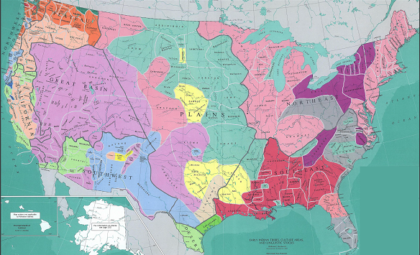 Our Unitarian Universalist faith calls us to fully examine the painful legacy of Christopher Columbus that displaced and disseminated generations of Native Americans and their rich cultures and societies. Our Principles require us to respect and learn from Indigenous Peoples and support their struggles for social justice and religious freedom.
Our Unitarian Universalist faith calls us to fully examine the painful legacy of Christopher Columbus that displaced and disseminated generations of Native Americans and their rich cultures and societies. Our Principles require us to respect and learn from Indigenous Peoples and support their struggles for social justice and religious freedom.
This year, many Unitarian Universalists across the country will join with other people of faith and goodwill in celebrating Indigenous Peoples’ Day. It changes Columbus Day from a celebration of colonialism into a chance to learn historical truths about the genocide and oppression of Indigenous Peoples in the Americas. It can also inspire us to organize against current injustices and to celebrate indigenous resistance.
The idea for replacing Columbus Day with Indigenous Peoples’ Day started in 1977 at a United Nations conference on discrimination against Indigenous People in the Americas. In 1990, South Dakota became the first state to do so. The city of Berkeley, Ca. became the first municipality to make the change in 1992. Since then, many states and cities now celebrate Indigenous Peoples’ Day instead of Columbus Day.
We must go beyond simply renaming and reimagining the holiday to rejecting the origin myths of the Americas that include the so-called “Doctrine of Discovery,” which led to the genocide of Native People. This 15th-century belief laid out by the Catholic Church maintained that European nations could claim the foreign lands they “discovered” in the “New World.” It led to the Indigenous inhabitants losing the right to their homeland as soon as the European settlers arrived.
Unitarian Universalists at the 2012 General Assembly passed a resolution repudiating the Doctrine of Discovery and calling for studying the doctrine and eliminating it from the current policies, programs, theologies, and structures of Unitarian Universalism.
In 2015, Beacon Press published an extraordinary book by Indigenous scholar and activist Roxanne Dunbar-Ortiz that challenges readers to relearn U.S. history by centering the story, experiences, and perspectives of Indigenous Peoples. In 2019, Beacon Press adapted the book for young people. Challenging myths and misinformation, it asks us to reject the common Eurocentric origin story of the United States taught in schools.
These two books became the UUA Common Read for 2019-20. They are An Indigenous Peoples’ History of the United States by Roxanne Dunbar-Ortiz. And An Indigenous Peoples’ History of the United States for Young People, adapted by Jean Mendoza and Debbie Reese.
To learn more about Indigenous Peoples’ Day, the painful origins of our country, and what we can do as Unitarian Universalists, consider these resources:
- Indigenous Peoples’ Day
- What Can Unitarian Universalists Do?
- GA 2020 – Fahs Lecture – Reflecting on Teachings about Indigenous Peoples
- Discussion Guides for Both Editions
- Teachers’ Guide to the Young People’s edition
- Webinar on Indigenous Peoples’ History, co-hosted by experts at the Smithsonian National Museum of the American Indian
 Rev. Karen Lee Scrivo is the affiliated community justice minister at Paint Branch Unitarian Universalist Church in Adelphi, MD
Rev. Karen Lee Scrivo is the affiliated community justice minister at Paint Branch Unitarian Universalist Church in Adelphi, MD

